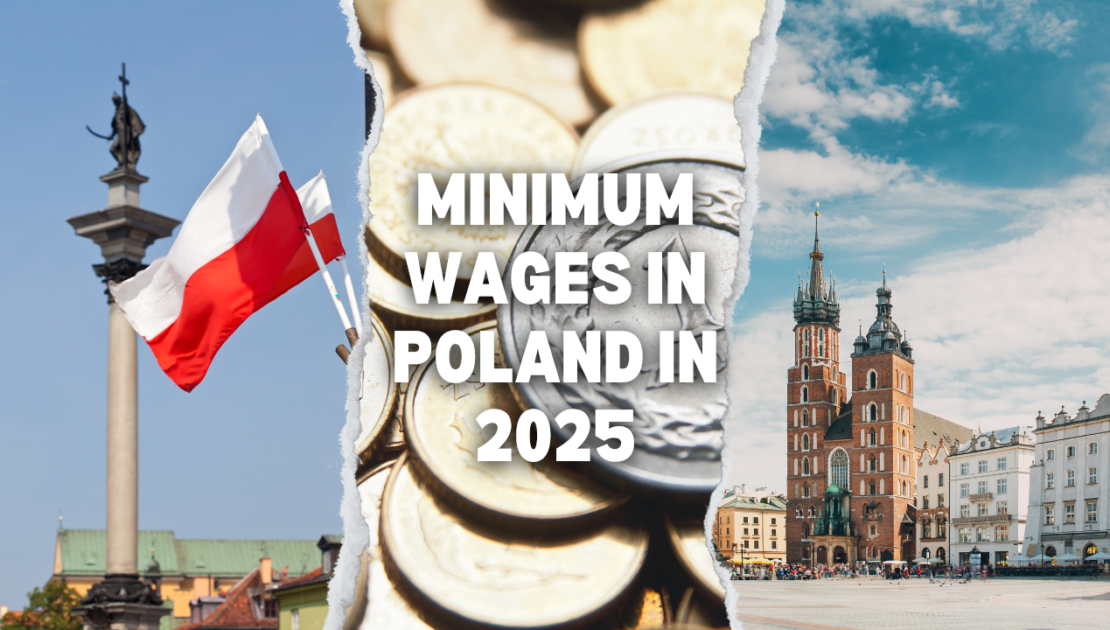Poland has become a major destination for Ukrainian workers seeking better job opportunities and higher wages. But what are the actual salaries in Poland compared to Ukraine? How do these wages translate into real earnings after taxes and living expenses? Let’s break down the numbers, explore the key differences, and provide practical insights for those considering working in Poland.
Average Salaries in Poland: A Significant Increase
According to the Central Statistical Office of Poland, the average salary in the country rose by 12.4% in the fourth quarter of 2024 compared to the same period in 2023. The gross salary (before taxes) now stands at 8,477 zlotys, which is approximately 87,000 hryvnias. Compared to the previous quarter, this is a 3.9% increase.
For comparison, in Ukraine, the average monthly salary as of September 2024 is around 20,590 hryvnias. This means that the average salary in Poland is more than four times higher than in Ukraine, making it a lucrative destination for job seekers.
Minimum Wage in Poland vs. Ukraine
Another important factor to consider is the minimum wage, which has also increased in Poland. Here’s how it compares:
- Poland (2024): The minimum wage increased to 4,242 zlotys gross per month from January 1, and further rose to 4,300 zlotys from July 1.
- Ukraine (2024): The minimum wage is 8,000 hryvnias per month before taxes. After taxes, an employee takes home approximately 6,160 hryvnias.
This means that even at the minimum wage level, Polish salaries are significantly higher than Ukrainian wages, making it easier for workers to afford better living conditions.
Why Do Ukrainians Choose to Work in Poland?
Many Ukrainians migrate to Poland for work due to the following reasons:
- Higher Wages: As shown above, salaries in Poland are considerably higher than in Ukraine, allowing workers to send money home or improve their standard of living.
- Geographical Proximity: Poland shares a border with Ukraine, making it easier for workers to travel back home frequently.
- Language Similarity: Polish and Ukrainian languages have many similarities, making it easier for Ukrainians to adapt.
- Job Opportunities: Poland has a high demand for workers in construction, agriculture, logistics, and the service industry.
- EU Work Experience: Working in Poland gives Ukrainians valuable experience in the European labor market, which can help them move to other EU countries like Germany in the future.
Worker Shortages in Poland: A Growing Demand
Poland is facing a shortage of workers in many industries. This has created numerous job openings, especially in sectors such as:
- Construction: Builders, welders, and electricians are in high demand.
- Manufacturing: Factory workers and machine operators are needed.
- Logistics: Truck drivers and warehouse workers are in demand.
- Healthcare: Nurses and caregivers are needed due to an aging population.
- Hospitality and Services: Hotels and restaurants require more staff.
Because of these shortages, many employers are willing to hire foreign workers, including Ukrainians, with relatively simple job requirements.
Challenges Ukrainians Face in Poland
Despite higher salaries and job availability, there are challenges that Ukrainians encounter when working in Poland:
1. Cost of Living
While salaries are higher, so is the cost of living. Some common expenses include:
- Rent: A one-bedroom apartment in a major city like Warsaw can cost 3,000–4,500 zlotys per month.
- Food: Monthly grocery expenses for one person range from 800 to 1,500 zlotys.
- Transportation: A monthly public transport pass costs around 150 zlotys.
- Health Insurance: Private health insurance can cost between 100 and 500 zlotys per month.
While wages are higher, workers need to carefully budget their income to maintain a good quality of life.
2. Language Barrier
Although Polish and Ukrainian are similar, they are not identical. Some jobs may require fluency in Polish, which can be a challenge for new migrants.
3. Temporary Work Permits
Many Ukrainians work in Poland for less than six months under short-term visas. This creates job insecurity, as workers must frequently renew their permits or apply for long-term residency.
4. Competition and Job Conditions
With many foreign workers seeking jobs in Poland, competition can be tough, and some employers may offer lower wages or poor working conditions to undocumented workers.
Is Germany Becoming a More Attractive Destination?
Recently, more Ukrainians have started moving from Poland to Germany. The reasons include:
- Even Higher Wages: Germany offers salaries that are almost twice as high as in Poland.
- Stronger Worker Protections: German labor laws provide better job security and benefits.
- EU Blue Card Program: Skilled workers have easier pathways to permanent residency in Germany.
However, Germany has stricter visa and language requirements, which makes Poland a more accessible option for many Ukrainians.
Final Thoughts: Is Working in Poland Worth It?
For many Ukrainians, working in Poland remains an attractive option due to higher salaries, job opportunities, and ease of travel. However, it is important to consider factors like living expenses, work permits, and job stability before making a decision.
Key Takeaways:
- Polish salaries are significantly higher than in Ukraine, but so is the cost of living.
- The minimum wage in Poland is over four times higher than in Ukraine.
- Poland has a growing demand for workers in multiple industries.
- Challenges include work permits, language barriers, and competition for jobs.
- Some Ukrainians are now choosing Germany for better wages and work conditions.
If you are considering working in Poland, it’s essential to plan ahead, research job opportunities, and ensure you have the necessary documentation to avoid legal or financial difficulties.



























0 Comments